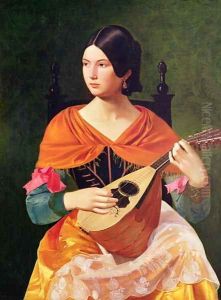Vekoslav Karas Paintings
Vekoslav Karas was a Croatian painter, born on April 19, 1821, in Karlovac, then part of the Austrian Empire, now Croatia. He is known for being one of the pioneers of fine arts in Croatia, and his work marks the beginning of modern Croatian painting. Karas's education and artistic training were rooted in Italian influence, as he spent a significant period in Italy, which was a common practice for artists from the region seeking classical training at the time.
Karas's early work was influenced by the Biedermeier style, which was prevalent in the Austrian Empire during his formative years. He trained in Vienna and later moved to Italy, where he studied in Venice and Rome. His time in Italy had a profound impact on his artistic style and technique. He absorbed the Italian tradition, particularly the work of the Venetian masters, which is evident in his use of color and light.
Although he was primarily known for his portraits, Karas also painted religious subjects, genre scenes, and landscapes. His portraits are especially valued for their psychological depth and the realistic representation of his subjects. He was skilled at capturing the social status and the personality of the individuals he depicted.
Unfortunately, Vekoslav Karas's life was cut short, and his artistic career was brief. He struggled with mental health issues and died under mysterious circumstances at the young age of 37 on July 13, 1858, in Karlovac. Despite his short career, Karas left a lasting legacy on Croatian art. His work bridged the gap between traditional and modern art in Croatia and laid the groundwork for future generations of Croatian artists.
